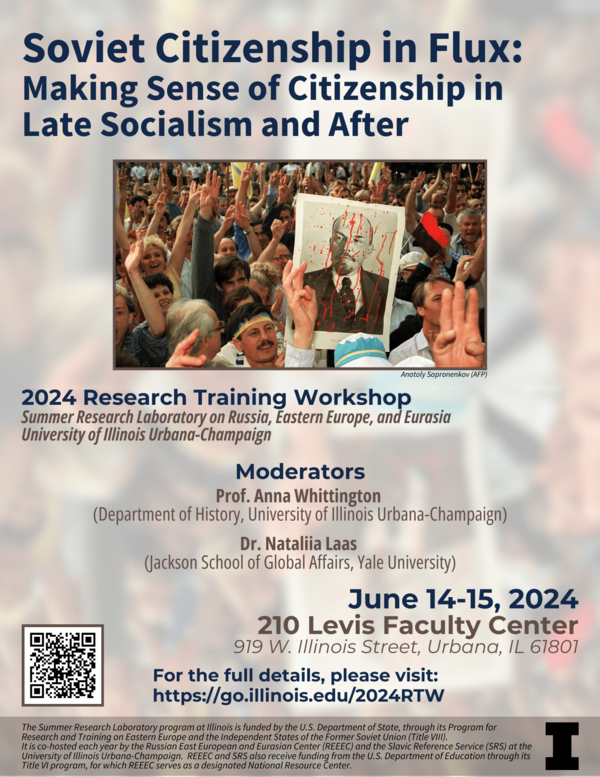
- Sponsor
- REEEC
- Cost
- Free and open to the public.
- Contact
- REEEC SRL
- reeec-srl@illinois.edu
- Views
- 194
- Originating Calendar
- Russian, E. European & Eurasian Center: Conference & Workshops
All sessions and panels hosted by the Summer Research Laboratory are open to the public. Any interested SRL Associates are invited to attend if they are on campus.
All sessions and panels are to be held in room 210 in the Levis Faculty Center (919 W. Illinois St., Urbana, IL 61801).
Day 1. Friday, June 14
11 a.m. Open Bibliographical Session with Slavic Reference Service (Research Resources on Citizenship)
Joseph Lenkart (Head, SRS)
1:15pm. Welcoming Remarks
John Randolph, Anna Whittington, Nataliia Laas
1:30–2:30pm. Opening Plenary Session, in Lieu of a Keynote
Anna Whittington: Citizenship in Flux: Toward a Historiography of Soviet Citizenship in Late Socialism and After
This opening “paper,” delivered as a public lecture and conversation (not a keynote but intended to provide a public-facing event), lays the intellectual groundwork of the workshop, by focusing on how scholars—historians, sociologists, anthropologists, and political scientists—have addressed matters of Soviet citizenship, both historically and in the present. We’ll end with questions that open the conversation to the audience, as we think collectively about how to write about Soviet citizenship, especially in the late Soviet and early independence periods.
2:30–3pm: Coffee Break (30 minutes)
Each of three panels revolves around two pre-circulated papers, 6–10,000 words in length. To keep the conversation accessible to a public audience, we’ll give each author 10––15 minutes to introduce their papers, after which an appointed discussant will spend 5 minutes summarizing key themes and points. The floor will then be open for discussion, with about an hour per paper, including all opening remarks and commentary. While grouped in panels, papers will be presented and discussed individually.
3–5pm: Panel 1. Redefining and Negotiating Citizenship in Late Socialism
Chair and Discussant: Nataliia Laas
Paper 1: Zayra Badillo-Castro: Social Mobilization and Self-Governance: Redefining Soviet Citizenship under Authoritarianism in Uzbekistan in the 1970s
Paper 2: Irina Nicorici: The Cold War’s Invisible Migrants: How Soviet Jews Negotiated Soviet Citizenship, 1960-1990
Dinner for Workshop Participants (Location TBA)
Day 2. Saturday, June 15
10am–12pm: Panel 2. Navigating Rights during Perestroika
Chair and Discussant: Anna Whittington
Paper 3: Madeleine Reeves: “We Are Citizens Too!” Homelessness, the Right to a House, and the ‘National Question’ in Late Soviet Frunze
Paper 4: Nataliia Laas: Consumerism vs Neoliberalism: The Consumer Rights Movement, the Rule of Law, and the Attempts to Reform Socialism in the late 1980s
Lunch Break
1:30–3:30pm: Panel 3. The Possibilities and Uncertainties of Glasnost
Chair and Discussant: Markian Dobczansky
Paper 5: Erin Hutchinson: Defending the Nation: Writers as Activists in the Era of Glasnost’, 1985-1991
Paper 6: David Kurkovskiy: Making Chornobyl a Fact of Ukrainian Literature: The Crisis of the Poet in Glasnost-era Ukraine
Break
4–5pm. Closing Discussion
Closing Dinner for Participants (Location TBA)
This Research Training Workshop is being conducted as part of the Summer Research Laboratory program at Illinois. This program is funded by the U.S. Department of State, through its Program for Research and Training on Eastern Europe and the Independent States of the Former Soviet Union (Title VIII). The Summer Research Laboratory program is co-hosted each year by the Russian East European and Eurasian Center (REEEC) and the Slavic Reference Service (SRS) at the University of Illinois Urbana-Champaign.
Some suggested readings, for both participants and audience members (not required):
- Golfo Alexopoulos, “Soviet Citizenship, More or Less: Rights, Emotions, and States of Civic Belonging,” Kritika: Explorations in Russian and Eurasian History 7, no. 3 (2006): 487–528.
- Serhy Yekelchyk, “A Communal Model of Citizenship in Stalinist Politics: Agitators and Voters in Postwar Electoral Campaigns (Kyiv, 1946–53),” Ab Imperio, no. 2 (2010): 93–120.
- Krista A. Goff, “‘Why Not Love Our Language and Our Culture?’ National Rights and Citizenship in Khrushchev’s Soviet Union,” Nationalities Papers 43, no. 1 (2015): 27–44.
- Adriana Petryna, “Biological Citizenship: The Science and Politics of Chernobyl-Exposed Populations,” Osiris 19 (2004): 250–65.
- Oxana Shevel, “Citizenship and State Transition,” in The Oxford Handbook of Citizenship, ed. Ayelet Shachar et al. (Oxford University Press, 2017), 407–30.
Also recommended (if you have lots of free time!):
- Frederick Cooper, Citizenship, Inequality, and Difference: Historical Perspectives (Princeton: Princeton University Press, 2018).
- Valerie Kivelson, “Muscovite ‘Citizenship’: Rights without Freedom,” The Journal of Modern History 74, no. 3 (September 2002): 465–89.
- Eric Lohr, Russian Citizenship: From Empire to Soviet Union (Cambridge: Harvard University Press, 2012), especially Chapter
- T.H. Marshall, “Citizenship and Social Class,” in Citizenship and Social Class, by T. H. Marshall and Tom Bottomore (Pluto Press, 1992), 1–52.